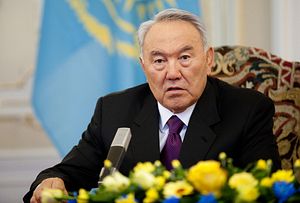As expected, Nursultan Nazarbayev has been confirmed as the ruling party’s candidate for the presidential elections that will be held next April in Kazakhstan. At the Nur Otan convention in Astana, Nazarbayev received countless endorsements from his party colleagues, maintaining a solid consensus. Nazarbayev even interrupted some of the speakers at the convention, regarding them as too flattering. Two among the delegates referred to him as “kissed by God.”
Earlier in March, Nazarbayev said that he “had different plans” for his personal future and took some time to ponder whether to run or not. Kazakhstan analysts fretted, as Nazarbayev seemed to have broken his usual pre-election routine. The speculation gathered momentum in the Kazakhstani press, but the “intrigue” around Nazarbayev proved to be short lived. During the party convention, after skipping through the endorsements, Nazarbayev dispelled any doubts and took the floor for more than one hour to explain the rationale behind his decision to run.
“My only purpose will be to face new challenges” he said, unequivocally accepting his colleagues’ nomination. Nazarbayev did not stop there. The president laid out a five-point program as his electoral basis. The plan reinforced old refrains about the country’s unity and harmony between diverse ethnicities, the aim of entering the top-30 ranking of most developed countries, and the aspiration to achieve economic diversification, while ridding the budget of its dependency on the extractive industry. “The idea of “Mangilik Yel” (Eternal Nation), together with the “Nurly Zhol” (Sunny Path) policy, shall be the guiding principle for the fulfillment of our tasks,” Nazarbayev underscored during his speech. This was one of the topics on which he spoke both in Russian and in Kazakh, to make sure that everyone in the room understood. Mangilik Yel emphasizes the Eurasian role that Kazakhstan should play in world affairs and is the expression of the message of strong internal unity inside the country. Nurly Zhol is the recently unveiled industrialization plan, a sort of Kazakhstani “New Deal,” devised to bring the country out of crisis.
Nazarbayev’s usual calls full of epochal paradigms and long-term objectives were not the most interesting parts of his speech. The president rehashed concepts he last spelled out back in November 2014, when he inaugurated the “Nurly Zhol” in a rather lackluster and disgruntled speech, mostly reading from a script. In contrast, on March 11, the president stirred the Nur Otan convention with a passionate, loud voice and some quirky jokes here and there. The last of his five points carried a game-changing significance. Notwithstanding Nazarbayev’s calm and authoritative pace as he pronounced his statement, nobody in the audience dared to applaud this last assertion.
“Once institutional reforms and economic diversification are achieved, the country should undergo a constitutional reform that entails the transfer of power from the president to the parliament and the government, in accordance with our traditions” Nazarbayev told the audience. This statement is unprecedented – in 2011 he only spoke vaguely about the “modernization of the political system” – and can be seen as a testament by the “father of the nation,” as it indicates that this might be Nazarbayev’s last term in office. The comments bewildered many observers, among whom Nargis Kassenova, professor at KIMEP University in Almaty: “I saw no intrigue in his indecision to run, I was surprised by his proposal of a liberal state, which is good news.”
The other candidates for the elections do not represent a credible alternative, and in some cases are Nazarbayev supporters. As a consequence, nobody expects any surprise from the April elections, which are likely to be marred by fraud, although support for the president would be high enough to allow a hands-down victory even in normal conditions. However, the next one will be a “transition term” for Nazarbayev, perhaps the first among Central Asia’s strongmen to prepare his own abdication.

































